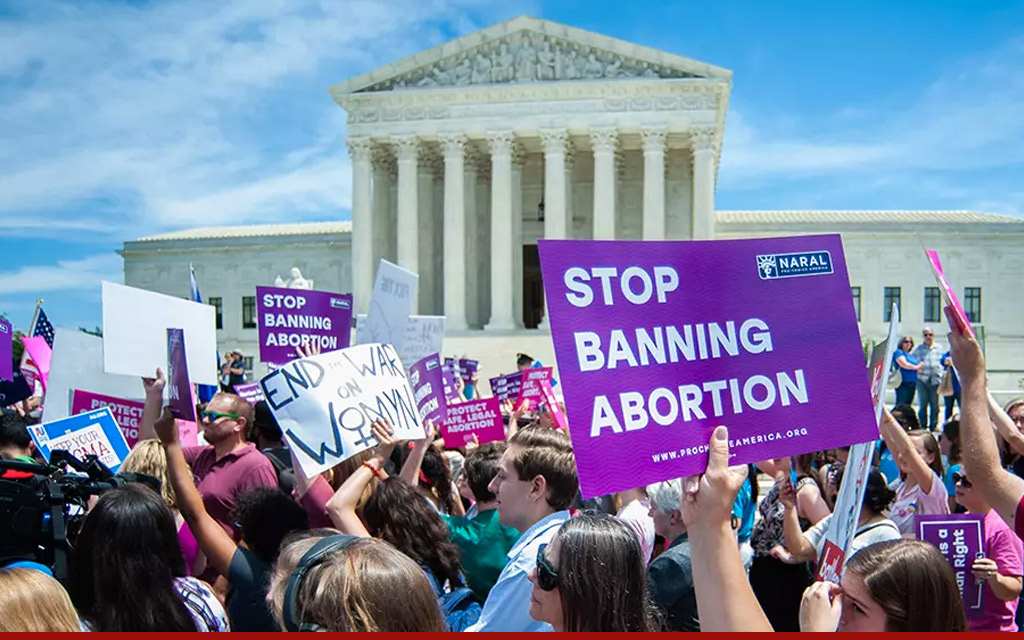Banning abortion pushes the U.S. towards the path of becoming a third rate power, with uneducated, unemployable citizens whose lives will need to be subsidized by government dollars.
Looking at abortion as solely a women’s rights issue has not served women well. It’s time to build a louder narrative around the larger economic issues, our country’s place in the world order, and overpopulation.
Typically I don’t overshare, but it’s time we all speak up. Eons ago, when I was a college student I had an abortion. I loved my partner very deeply but knew that I was not yet ready to raise myself, never mind a family. I had to do a lot of research and then travel to a different state to have the procedure, since Pennsylvania, where I lived, didn’t legalize abortion until 1982. I scraped together the money from friends. And I never told my parents.
Every woman who has a story about how abortion saved them from a very different life trajectory needs to speak up now.
I thought that the mostly bi-partisan war over the right to choose would last forever. It provided a clean, convenient wedge between party ideologies. Something we could disagree on in theory, while retaining our rights in perpetuity. I called that one wrong. I didn’t see SCOTUS, even the newly stacked one, as having the guts (polite word) to break the nearly five-decade old barricade of its 1973 Roe v. Wade decision.
Collectively we’ll do the obligatory handwringing about whistleblowing and document leaking. Women will be deservedly incensed about the loss of hard-won freedom. But we all know how the story ends. SCOTUS decides that it’s beyond their scope to decide the fate of a woman’s right to choose. It will become a state by state issue where the state that you live in becomes more important to abortion rights than religion, education, gender or pretty much any other factor. Twenty states (representing 40% of the country) are poised to ban abortion immediately following the court’s decision, which as Trevor Noah pointed out “will make living in South Dakota harsher than living in Afghanistan under Sharia law.”
Logic, like the fact that most people in this country don’t want to do away with Roe v. Wade, no longer seems to matter. Protests demanding the right to choose only seem to increase the zealousness of the opposition. It’s time to broaden the abortion rights story so that it hits lawmakers where it hurts — their pocketbooks and their egos. The story needs to shift from just being about rights to a larger one about economics, population control, family planning, health, and most importantly, America’s waning influence in the modern world.
Which Country Do You Want to Look Like
Banning abortion puts the U.S. in some very bad company. Abortions are completely banned in the Dominican Republic, El Salvador, Honduras, and Nicaragua. Those are really poor countries with a multitude of problems. Others that ban abortions include Republic of the Congo, Haiti, Iraq, Senegal, Sierra Leone, Suriname, Tonga, and the West Bank & Gaza Strip – generally not happy places with vital economies.
There are, by contrast, no restrictions on abortions in Canada, Sweden, Switzerland, Denmark and even in predominantly Catholic countries like Italy and Ireland. It’s reasonably clear that if you overlay the map of where abortions are banned on top of a map that delineates quality of life and prosperity, you see a pattern.
Even some of the most authoritarian countries like Iran and Russia have no restrictions on abortions. And China, which we love to fault for its human rights violations, has no nationwide ban on abortion. Instead there are governmental agencies whose job it is to help with family planning. Most countries fall on a spectrum where abortion laws are conditional, focused on saving a woman’s life, maintaining her health, mental health issues, rape and incest, fetal impairments and sometimes even the socioeconomic situation of the mother. In Cyprus, Hong Kong, Finland and Barbados, for example, you can be granted an abortion if you are not financially able to raise a child. The map is varied and complex, but if the U.S. were to leave abortion rights up to the states, a large swath of the country would quickly fall into lockstep with some of the poorest, least healthy countries on earth.
We All Pick Up the Tab
Abortions are going to happen whether they’re legal or not. Illegal ones are just more dangerous. Maternal health in the United States is already at the pathetic line. We’re tied for 57th place, and studies show that banning abortions would increase the rate of maternal death by 20-30%.
In our choiceless future, we’ll see more hungry babies born to mothers who can’t feed or educate them properly. Women will be held back from entering the workforce and earning good salaries because of unwanted pregnancies. Seriously-disabled and impaired children will be born into families that cannot provide for their needs. There will be enormous mental health repercussions of unwanted pregnancies.
The list goes on and on, but at the end it’s the taxpayers who will pick up the burden of bringing unwanted children into the world. In some states — Georgia, Mississippi, and Oklahoma — more than 80 percent of unplanned births are already paid for with public dollars. Unplanned pregnancies cost US taxpayers $21 billion each year, according to one analysis. And that’s what it’s been like while abortions have been legal.
A study by the Brookings Institution found that abortion access “profoundly affects women’s lives.” It explains that having that right helps determine “whether, when, and under what circumstances they become mothers, outcomes which then reverberate through their lives, affecting marriage patterns, educational attainment, labor force participation, and earnings.” The bottom line, says the study, is that “Restricting, or outright eliminating, abortion access by overturning Roe v. Wade would diminish women’s personal and economic lives, as well as the lives of their families.”
I’m not a political scholar, but I understand how to tell stories. When the “it’s the right thing to do” story stops resonating, turn up the volume on a new story. Banning abortion pushes the U.S. towards the path of becoming a third rate power, with uneducated, unemployable citizens whose lives will need to be subsidized by government dollars.
SOURCE :
https://techonomy.com/we-need-to-change-the-abortion-rights-narrative/




